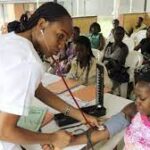By Hassan Zaggi
COVID-19 vaccine safety and side effects have been identified to be among the major factors fueling vaccine hesitancy in Nigeria, a study conducted by the National Institute for Pharmaceutical Research and Development (NIPRD) has shown.
This, the study suggested may be due to the accelerated development of the COVID-19 vaccine. Other contributory factors may include several negative campaigns targeted at discrediting the vaccines and querying its safety.
The study which was aimed examining COVID-19 vaccine hesitancy and willingness to pay is said to be the first of its kind, because, “no COVID-19 related study has robustly explored factors associated with vaccine hesitancy whilst also assessing a willingness to pay for emergent vaccines.”
The study was conducted in Abuja and itused a cross-sectional approach to undertake online and physical data collection with a validated questionnaire.
A total of 1767 valid responses were received. The female participants were in the minority (42.2%), majority (54.9%) of the study participants were between the ages of 18 and 30 years, and more than half (53.8%) of the participants were educated up to first degree level.
While presenting its findings, the study said: “ Slightly above half (52.9%) of the study participants indicated that they were worried about side effects that may be associated with COVID-19 vaccines, and this may likely prevent them from taking the vaccine. A strong majority (85.1%) of the study participants indicated that COVID-19 vaccine should be administered at no cost to citizens.
“Only a quarter (26%) of the participants were willing to pay a fee for COVID-19 vaccination. Also, older participants and those that had been previously infected with COVID-19 were more likely to pay for COVID-19 vaccination.”
The study therefore, advised that “to avoid poor implementation outcomes associated with vaccine hesitancy, population concerns about safety should be highlighted and comprehensively addressed during enlightenment campaigns.
“Also, developing engagement strategies that clearly outline that benefits associated with COVID-19 vaccines outweigh the associated risks, can help better inform the populace and consequently improve their acceptance of the intervention.
“Paying a fee for COVID-19 vaccination may reduce uptake of the vaccine as revealed by this study. Since it is critical for government and policymakers to develop contextual strategies aimed at achieving optimal immunisation, this emergent evidence can help improve uptake and reduce hesitancy.
“The current policy direction suggests government’s responsibility for funding the first phase of the immunisation campaign. If a policy change is being considered, findings relating to willingness to pay from this study can underpin an effective selection framework.
“Individuals of the male persuasion and being previously infected with COVID-19 were associated with higher willingness to pay for COVID-19 vaccination. Similarly, when compared to their younger contemporaries, older persons were more likely to pay to be vaccinated against COVID-19.”
The study, therefore, insisted that assuring citizens of the safety of vaccines was critical to achieving public health immunisation goals.
The study further advised that: “Nevertheless, given the accelerated development of these vaccines, concerns expressed in this study are logical and if not properly addressed, could increase hesitancy.
“A failure to address these concerns could delay or prevent the achievement of herd immunity alongside other possible public health consequences.
“Although a relatively small proportion of the sample indicated their disbelief in the existence of COVID-19, this finding is still significant, given the ramifications for misinformation together with the consequent risks for public health.”



